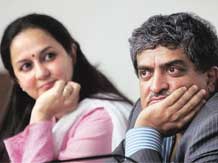EkStep to pilot its first app for education survey

To address learning challenges in the primary education space, Nandan and Rohini Nilekani promoted Ekstep ,to pilot its first social venture app for the Annual Status of Education Report (ASER) survey.
Carried out every year by ASER Centre, the research and assessment arm of not-for-profit organization Pratham, the survey is said to be the most credible source of information in children's learning outcomes available in the country. While for the past 10 years, ASER has been doing this manually with pen and paper, this is for the first time that the assessment is being fully digitized using the EkStep platform, said Shankar Maruwada, CEO of EkStep.
As a part of the survey which has been christened as Lakhon Mein Ek this year, ASER Centre intends to cover 100,000 villages with the help of around 10,000 volunteers. This year, the volunteers would use smartphones powered by ASER App developed by EkStep to conduct the survey among the children who are primarily in the age group of 3-16. The test results would be assessed real-time with the help of the back-end support from EkStep team.
"They have been doing the survey for the last 10 years, but manually. Now with the Digital ASER App, they will be able to publish the results of the app real time," said Maruwada. "That is an initial pilot which will help us in understanding what will work and what will not. And going forward, we will do more such pilots."
Set up by the Nilekanis with an initial commitment of $10 million, EkStep looks at solving the 'learning problem' by creating a technology-led platform which will help children in improving their 'learning outcomes', quite early in their life. EkStep intends to do it using gamified apps which will be hosted in Google playstore.
The backbone in this would be 'EkStep Genie', a meta-app which will contain lots of gamified apps for which EkStep is working with an external partner organization. They are laying out a framework developed based on its research work done in association with many academics, psychologists, neurologists of global repute.
"What we are saying is in primary learning, there is a 'learning problem' among early learners. A lot of the children are going to school which is great, but the 'learning outcome', especially at the primary level, is dismal," said Maruwada.
So our effort would be to understand that problem, and instead of just we solving the problem, to create an open infrastructure which allows those in the education space - policy makers, people who design curriculum, content creators, parents and tuition teachers -- to solve it," added Maruwada.
Post Your Comments for this News
Related Articles
-
Tips for Teaching Coding in Classroom
2017-06-16 12:39:35
-
How to Prepare for Student Orientation Day
2017-05-18 12:53:05
-
World Day for Cultural Diversity for Dialogue and Development.
2017-05-18 10:27:42
-
Big Data for Big Impact #WTISD-17
2017-05-17 09:28:16



